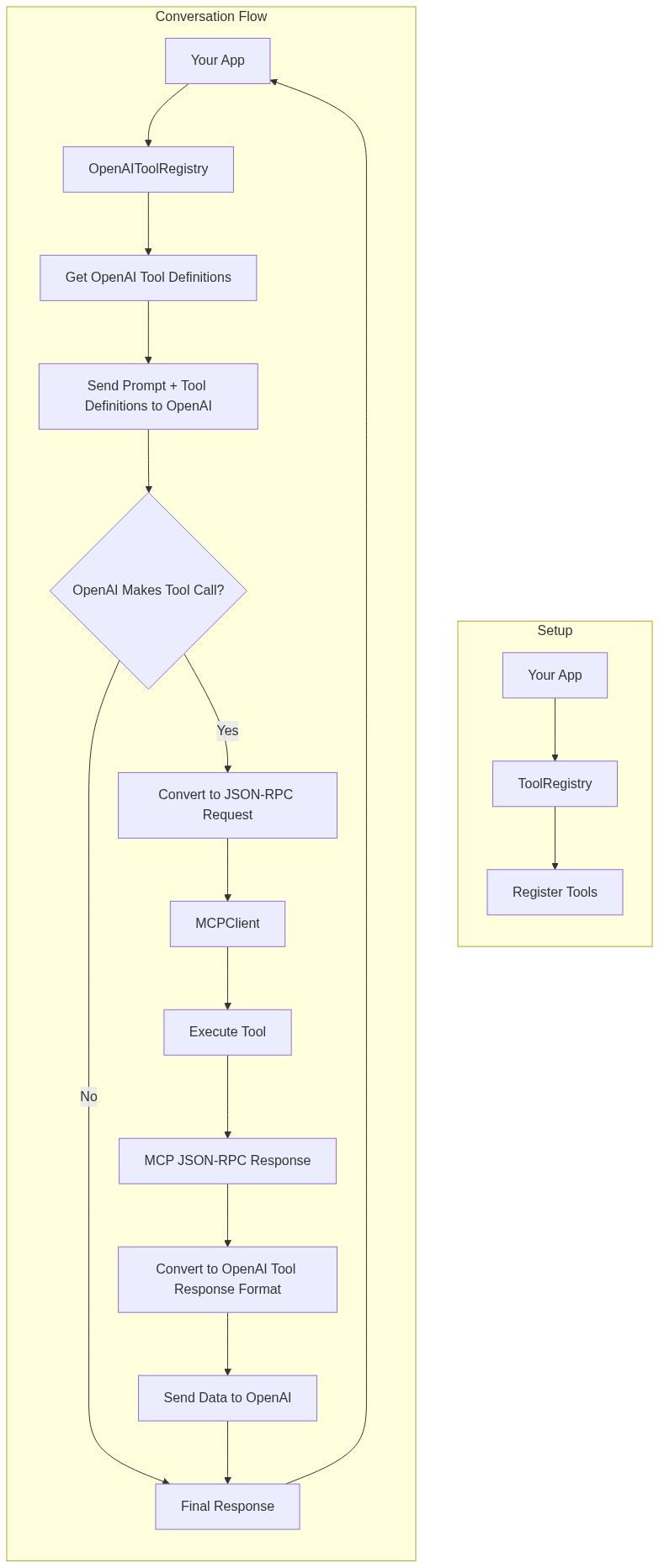SwiftMCP
by compiler-inc
SwiftMCP is a Swift Package that implements an MCP client for iOS and macOS, enabling native API integration through a JSON-RPC interface. It also includes an OpenAI-compatible function calling bridge for interacting with native iOS APIs.
Last updated: N/A
SwiftMCP
A Swift Package that implements an MCP (Model Context Protocol) client for iOS and macOS, enabling native API integration through a JSON-RPC interface. The package also includes an OpenAI-compatible function calling bridge.
Features
- Open source function definitions for Apple's native APIs like HealthKit
- JSON-RPC 2.0 compliant interface
- Some test coverage
Requirements
- iOS 15.0+ / macOS 12.0+
- Swift 6.0+
- Xcode 15.0+
Installation
Swift Package Manager
Add the following dependency to your Package.swift file:
dependencies: [
.package(url: "https://github.com/compiler-inc/SwiftMCP.git", from: "1.0.0")
]
Architecture
Usage
Basic Setup
import SwiftMCP
// Create a tool registry
let registry = ToolRegistry()
// Create an MCP client with a response handler
let client = MCPClient(toolRegistry: registry) { response in
print("Received response: \(response)")
}
// Register tools
do {
let healthKitTool = try HealthKitTool()
registry.register(tool: healthKitTool)
} catch {
print("Failed to initialize HealthKit tool: \(error)")
}
OpenAI Integration
This example demonstrates:
- Setting up the MCP client with HealthKit tool
- Creating an OpenAI bridge and registering the tool schema
- Converting MCP tools to OpenAI function definitions
- Sending an initial request to OpenAI
- Processing any tool calls through MCP
- Sending the tool results back to OpenAI for final summarization
The flow allows OpenAI to:
- Request step count data using the HealthKit
getDataaction - Request workout data using the HealthKit
getWorkoutsaction - Receive the actual health and workout data through MCP
- Provide a natural language summary of the data
import SwiftMCP
import OpenAI
// 1. Set up MCP client and tools
let registry = ToolRegistry()
let client = MCPClient(toolRegistry: registry) { response in
print("Received response: \(response)")
}
// Initialize HealthKit tool
let healthKitTool = try HealthKitTool()
registry.register(tool: healthKitTool)
// 2. Set up OpenAI bridge
let openAIRegistry = OpenAIToolRegistry()
let healthKitSchema = JSONSchema(
type: .object,
properties: [
"action": .init(type: .string, enum: ["getData", "getWorkouts"]),
"dataType": .init(type: .string, description: "Type of health data to retrieve (e.g., stepCount, heartRate)"),
"timeRange": .init(type: .string, enum: ["today", "yesterday", "this_week", "last_week"]),
"workoutType": .init(type: .string, enum: ["running", "cycling", "walking"]),
"includeRoutes": .init(type: .boolean)
],
required: ["action"]
)
// Register the HealthKit tool with its schema
openAIRegistry.registerTool(healthKitTool, schema: healthKitSchema)
// 3. Get OpenAI function definitions
let functions = try openAIRegistry.getOpenAIFunctions()
// 4. Create OpenAI client and chat request
let openAI = OpenAI(apiToken: "your-api-key")
let query = "What was my step count today and how many calories did I burn in my last run?"
let chatRequest = ChatRequest(
model: .gpt4o,
messages: [
.init(role: .user, content: query)
],
functions: functions,
functionCall: "auto"
)
// 5. Send request to OpenAI
let result = try await openAI.chat(request: chatRequest)
// 6. Handle any tool calls from OpenAI
if let toolCalls = result.choices.first?.message.toolCalls {
// Process each tool call through MCP
let toolResponses = try await openAIRegistry.handleToolCalls(toolCalls)
// 7. Send follow-up request to OpenAI with tool results
let followUpRequest = ChatRequest(
model: .gpt4,
messages: [
.init(role: .user, content: query),
result.choices.first!.message,
.init(role: .assistant, content: nil, toolCalls: toolResponses)
]
)
// 8. Get final summarized response
let finalResult = try await openAI.chat(request: followUpRequest)
print(finalResult.choices.first?.message.content ?? "No response")
}
Note: Make sure to handle errors appropriately and replace "your-api-key" with your actual OpenAI API key.
OpenAI Function Calling Bridge
// Create and set up the OpenAI bridge
let openAIRegistry = OpenAIToolRegistry()
// Register your MCP tools with their schemas
openAIRegistry.registerTool(healthKitTool, schema: healthKitToolSchema)
// Get OpenAI function definitions
let functions = try openAIRegistry.getOpenAIFunctions()
// Handle OpenAI tool calls
let toolCalls: [OpenAIBridge.ToolCall] = ... // from OpenAI response
let toolResponses = try await openAIRegistry.handleToolCalls(toolCalls)
Handling JSON-RPC Requests
// Example JSON-RPC request for health data
let request = JSONRPCRequest(
jsonrpc: "2.0",
method: "healthKit",
params: [
"action": .string("getData"),
"dataType": .string("stepCount"),
"timeRange": .string("today")
],
id: "1"
)
// Example JSON-RPC request for workouts
let workoutRequest = JSONRPCRequest(
jsonrpc: "2.0",
method: "healthKit",
params: [
"action": .string("getWorkouts"),
"workoutType": .string("running"),
"includeRoutes": .bool(true),
"timeRange": .string("last_week")
],
id: "2"
)
if let data = try? JSONEncoder().encode(request) {
try await client.handleIncomingMessage(data: data)
}
Creating Custom Tools
class CustomTool: MCPTool {
let methodName = "custom/method"
func handle(params: [String: JSON]) async throws -> [String: JSON] {
// Implement your custom functionality here
return [
"status": .string("success"),
"result": .object(["data": .string("your data here")])
]
}
}
Available Tools
HealthKitTool
Provides comprehensive access to HealthKit data through the MCP interface.
Methods
-
healthKit-
Actions:
-
getData: Retrieve health metrics- Parameters:
dataType: Type of health data to retrieve (e.g., "stepCount", "heartRate")timeRange(optional): Predefined range ("today", "yesterday", "this_week", etc.)duration(optional): ISO 8601 duration string (e.g., "P7D" for 7 days)
- Returns:
dataType: The type of data retrievedunit: The unit of measurementsamples: Array of data points with values and timestamps
- Parameters:
-
getWorkouts: Retrieve workout data- Parameters:
workoutType(optional): Type of workout to filter by (e.g., "running", "cycling")includeRoutes(optional): Boolean to include GPS route datatimeRange(optional): Predefined rangeduration(optional): ISO 8601 duration string
- Returns:
workouts: Array of workout data including:type: Workout typestartDate: Start timestampendDate: End timestampduration: Duration in secondsdistance(optional): Distance in meterscalories(optional): Energy burned in kilocaloriesroute(optional): Array of GPS coordinates with timestamps
- Parameters:
-
-
Error Handling
The package uses the MCPError type for error handling, which includes:
toolNotFound: When the requested method doesn't existinvalidParams: When the request parameters are invalidtoolError: Generic error case for tool-specific errors with a descriptive messagejsonParsingError: When JSON parsing failsinvalidRequest: When the JSON-RPC request format is invalid
Contributing
I want to add as many iOS APIs as possible to this repo. The goal is to create a comprehensive collection of MCP-compatible tools for iOS development.
Any contributions are welcome! Please feel free to submit a PR.
License
This project is licensed under the MIT License - see the LICENSE file for details.
